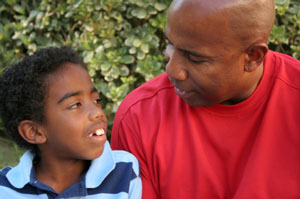
|

 |
|
What is Positive Parenting?What is positive parenting? It is, in short, learning to emphasize on your child's positive behavior rather than focusing on the negative all the time.
Me? Negative?We all try to be positive parents, but that negativity creeps in before we know it. Just like with everything else, parenting is a skill that must be learned, and learning to parent well is an ongoing process for as long as you are a parent.James Windell, author of Eight Weeks to a Well-Behaved Child: A Failsafe Program for Toddlers Through Teens, recommends getting a pocket notebook and drawing two columns: one for positive remarks and the other for negative remarks you make to your child. If you have more than one child, have a separate page for each child. Throughout the day, as you make comments to your children, make a mark for every positive and negative comment you make. The results may surprise you, and you might find that you are making far more negative remarks to your children than positive ones. Keep it QuietDon't let your children know that you are keeping tabs on your own comments, and include comments that include the word "but", such as, "I appreciate you playing with your little brother, but try not to yell at him." Also take note of the times when you are tired, irritable or hungry, as people tend to be more critical at those times.At the end of five days, take a tally. Your notions on what is positive parenting may radically change as you see the results of your own self-test. You may be parenting more through criticism than positive reinforcement. And while it's never a good idea to praise every single thing your child does, what is positive parenting is making a point to comment positively on your child's good behavior. You'll soon find that your child is eager to please you and will enjoy being good as much as you enjoy having a well-behaved child. The ultimate positive parenting recipe includes five powerful ingredients for empowering kids to lead happy and conscious lives. Learn more at Positive Parenting Ally. Learn positive parenting techniques with this excellent program. Also, use your computer for an easier way to discipline your children. How to Become a Positive ParentTeach your children that good behavior will lead to positive benefits. There are a number of ways to do this, including using a parenting program that allows children to earn tickets for demonstrating good behaviors and positive values.Learn to modify your child's behavior by watching your language. By stating commands in the positive rather than the negative, you can teach your children in subtle, yet powerful ways. You can practice better discipline methods by teaching your children that it is their behavior, rather than your anger, that has both positive and negative outcomes, eliminating your anger and frustration in the process. Peace at HomeThere are excellent programs out there to help you with this goal. The important thing is to take a positive step toward positive reinforcement parenting. Your home will become more harmonious, and you'll all be happier and live in a more peaceful environment.More Information on Raising Adopted ChildrenDo you long to adopt more children, but feel like you can't afford it? Finances are the number one reason many children do not adopt a second or third child. But it can be done. We adopted all three of our children without going into debt. So can you. Learn how.Are you single and thinking about adopting? It can be tough to be a kid raised by a single parent, but there are also advantages to being a single parent. Adopted children who are now grown can tell us a lot about how to raise an adopted child. Here are some tips. The first time you hold that precious child in your arms, you may be tempted to protect her from every conceivable harm. But that may not be the best thing for her. Here are some reasons to avoid helicopter parenting. Although it is rare, there are failed international adoptions. Learn the warning signs before it is too late by reading this article. When celebrities like Madonna are raising adopted children, it has an impact on international adoption for both good and ill. Learn how. Learning about adoption does not have to be a major or traumatic issue for your child. Learn some useful tips on telling her about her adoption here. Good parenting skills are something most adoptive parents are thinking about while on their international adoption journey. We truly appreciate these precious children and want to raise them the best way we know how. Read more. Raising adopted children through a permissive parenting style is an easy trap for adoptive parents to fall into, but if you choose to parent your child without rules both you and your child will suffer for it. Read more. Sign language is a great tool for anyone raising adopted children, especially internationally adopted children by providing parents with an easier way of communication during those early days and easing frustration for their child. Read more. Most adoption stories are told from the parent's perspective. It was truly refreshing, therefore, when I stumbled across the story of one adoptee who reunited with her family in Taiwan. Read more. An international adoption resource to help parents effectively communicate with their newly adopted children was the goal of one adoptive mom when she created Russian for Adoptive Parents and Chinese for Adoptive Parents. These programs teach parents comfort phrases in their children's native languages. Read more. Having a learning disabled child is likely, especially if you adopt more than one child internationally or even domestically. But these children can be just as intelligent as any other child, and raising adopted children with learning disabilities can be delightful, although they will have their own unique challenges. Children that are adopted; what's the rest of their story? What happens to them when they are grown, and how do they feel about being adopted? International Adoption Facts and Information is starting a new series where we hear the stories of adults who were adopted internationally as children. This is the first in that series. Adopted children and parents who are raising adopted children are no different from any other relationship between a parent and child. It's not biology that makes a relationship, but rather time, devotion and love. Here is one adopted person's story. International adoption Mexico is one person's story of being born in Mexico and then eventually be adopted in the United States. Adopted child syndrome - ever heard of it? Basically, it's a controversial label used to explain hurtful and destructive behaviors in adopted children such as violence, defiant behavior, lying, stealing and reactive attachment disorder. If your child has been diagnosed with ADHD, take heart; it's not nearly as difficult to raise a child with ADHD as you may think. But please do think twice before putting him on a prescription medication. Learn more. Want to build your newly adopted child's immune system, protecting him from a host of nasty bacterial, viral and fungal infections? Feed him this healthy oil. For the best bonding experience in the world plus the best nutrition for your newly adopted baby, consider breastfeeding him. Yes, it can be done. Read more. Have you ever wondered what the phrase, positive parenting means? It's learning to focus on the positives rather than the negatives. Learn more. Looking for ways to raise your children without nagging or yelling? Read more. What happens if the child you adopt is displaying autistic tendencies? Take heart; he or she will very likely improve with time. Learn more. Nobody wants to adopt a child with serious emotional problems, but being prepared for the unexpected is the best way to successful parenting and preventing a disrupted adoption. Learn more. Understanding the reasons why siblings fight is a good way to prevent rivalries and promote family harmony. Learn more. Adoption books are a great way to explain adoption to young children and open the door for discussion about sensitive adoption issues such as birth parents, and why your child was placed for adoption. Here are some great books your child will love. Read more. Learning to cook ethnic recipes from your child's country of birth will be a comfort to your older child and a great learning experience for children adopted at a younger age. Read more. If you're waiting for your adopted child to be grown before telling him he's adopted, you may be doing more harm than good. Here's why. If your child is of another race, make sure you teach your child to be proud of his race and to appreciate his and other cultures. Learn more. When a child is adopted internationally, he must not only deal with the shock of new parents, but also often a new language, customs and even different food. Follow these tips to make the transition easier. It's always best to be open with your child about his adoption, but how do you approach the subject with him? Here are some tips. Your grown child is looking for his birthparent. So should you feel threatened? Absolutely not. Here's why. Are you worried that your newly adopted child is so different you won't be able to attach to her? Then you need to read this article. Click here. As adoptive parents, we often place high expectations on ourselves as parents and it's easy to become discouraged. That's when it's time to realize you're a normal parent with normal feelings. Read more. A birth mother who searches for, and even comes back to take back a child she has given up for adoption. Is this possible? This issue was addressed recently in the hit show Glee, when teen mom Quinn, who had given up her baby for adoption in a previous season, announced she wanted to get her daughter back. Read more. |
Pay Adoption Costs
Adopt Debt free will provide you with the tools and techniques to completely pay for your adoption and bring your child home without having to go into debt!
|
|
|
Enjoy This Site?
Then why not use the button below, to add us to your favorite bookmarking service? |
||
|
| Home | What's New? | Contact Me | Free Ezine |
Template Design
| What Country? | Children Available | Handling Paperwork | Getting Help | The Wait| Getting Ready | | Paying For Your Adoption | Adopt Debt Free | Celebrating Your Adoption | Raising the Adopted Child |
|
||
|
| ||